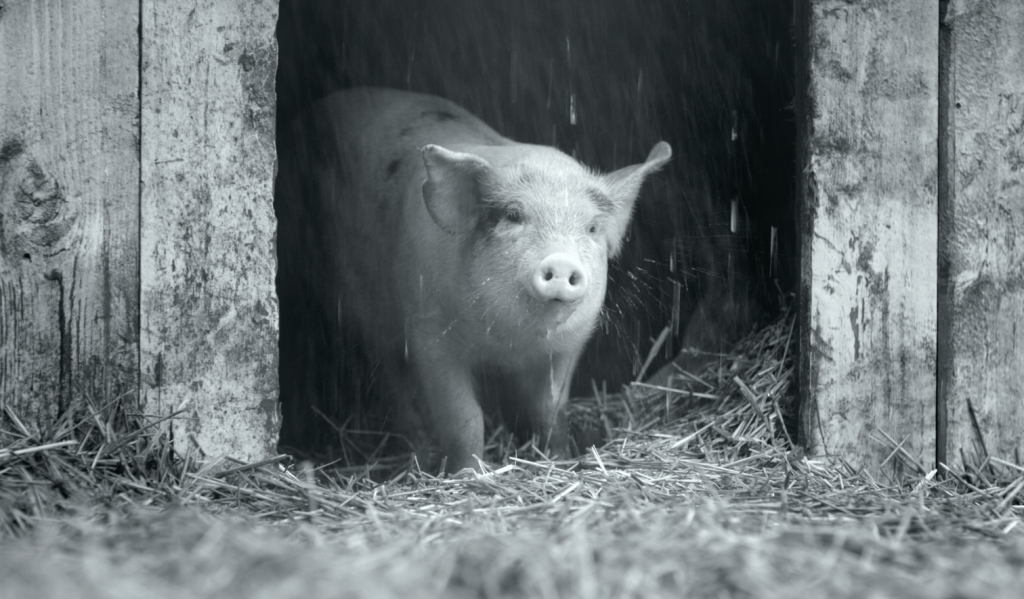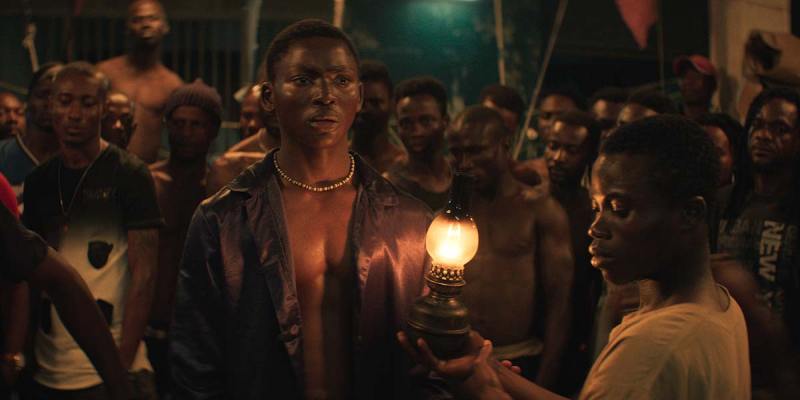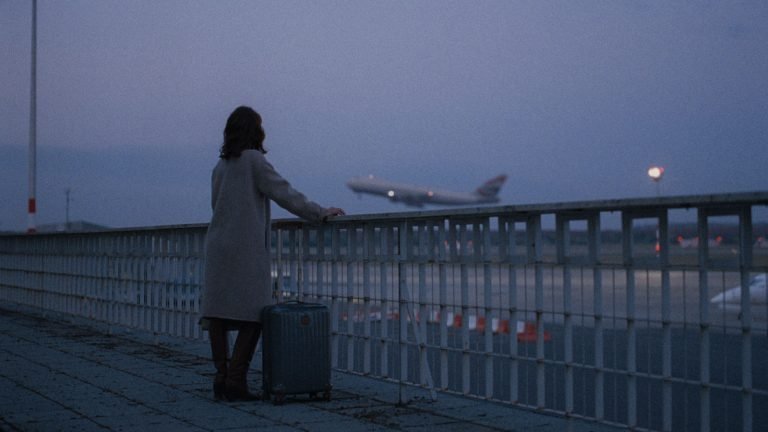NYFF58 Week One: In Search of Lost Time
- Published on September 25, 2020
- by Igor Fishman
The New York Film Festival pushed its way into the hell of 2020 like a birthday gift lost in the mail – the box banged up and worse for wear but the goods were still intact. Gone were the intangible festival pleasures like stumbling into the obnoxious Joker red-carpet or seeing Pedro Almodóvar tearing up at the balcony feet above me. I’ve never been a purist about the big screen, and have watched tons of film curled up in bed with my laptop, but this time of year especially, I can’t say that I don’t miss the theatrical experience. That said, the virtual format comes with a massive silver lining, as it opens up my favorite film festival to the entire country. And so as I readied to fire up Cristi Puiu’s Malmkrog, the same way I fired up Scoob! earlier this year, I thought about the oft invisible, but no-less legitimate communal experience we can have with an infinite distance between us. An odd convergence of people getting ready to spend some beautiful Friday night watching a three and a half-hour adaptation of some heady Russian novel. This thought ran through my mind as I sat there waiting for 8 o’clock hit so that I and however many more like me could all hit play at once – together.


Malmkrog
(dir. Cristi Puiu, 2020)
Malmkrog is a tough sell of a film, a three and a half hour stay at a stately Transylvanian manor where disaffected bourgeois elites casually (and callously) debate the morality of war, Russian identity, and the gospels, as servants pour brandy and set out decadent meals. While the protagonists might be oblivious to their disconnect from a tangible reality, director Cristi Puiu is certainly not. Over its somewhat intimidating runtime, Puiu crafts a counter-thesis to the self-indulgent dialogues through changes in filming style, focus on the staff, and a dramatic burst of violence which drags the film to Bunuelian heights.
Dense with both subtext and text, Malmkrog is a sophisticated and formally impressive work, from the immaculate cinematic compositions to the performances. The dialogues are filmed in static long takes, and the passion and ease with which the performers recite the labyrinthian text is surely a feat of theatrical prowess to be witnessed. Yet, the depths of the material are often wholly at the whims of your patience. All of this is to say that, the film’s power is limited by your level of engagement with the subject matter at hand, whether this is the philosophical ping pong on the ethics of murder, or the pompous monologuing of imperialist views on race, or the elusive theological back and forth that concludes the film.
For a work that for many I believe will elicit a love or hate reaction, I found myself genuinely trapped in between. Though I was perpetually impressed by the actors and cinematic turns, I found myself too often unengaged with the spirited monologues at hand. In interviews, Puiu intimated that some of the interweaving structures of the source material (Three Conversations by Vladimir Solovyov) become clearer on a second or third viewing, but while I was glad for the beguiling visit, I have some doubts that I will return.


Gunda
(dir. Victor Kossakovsky, 2020)
The modern nature documentary is by now a known quantity. The very words bring to mind images of whales, a generic orchestral symphony, and David Attenborough’s commanding narration. More often than not these documentaries, especially played at home on a TV, exist as wallpaper or smooth jazz, background noise for putting away groceries, or a collage of pleasing visuals for a stoned couch nap. Victor Kossakovsky’s Gunda attempts to break from some of these norms to create something a little more striking. The kaleidoscopic colors and fantastical locales are replaced with a Norwegian farm shot in cold black and white. There is no narration or music, and though the marketing prominently lists Joaquin Phoenix’s name, he is merely a producer, so no talking heads either. We are left with simply the footage of farm life without a human soul in sight, and though Gunda, the sow on the poster, and her piglets take up the majority of the time, we also spend a hefty portion with some roosters and cows as well.
Kossakovsky films in extreme close-ups on limbs and body parts, drawing natural parallels to human anatomy. He often sets the camera low to the ground and accompanies this footage with encompassing sound design to mirror the animal perspective. The results of this are often impressive, roosters in moments resemble dinosaurs, while shots of cows held long enough begin to mimic portraiture – the camera lingered long enough on one, in particular, that struck me as having a shaggy quarantine haircut. At times, this brusque minimalism and freewheeling nature of farm animals in their element may become tedious, yet, this extra time spent in this world further empowers the strength of the conclusion within which we refocus on Gunda and her litter. Those worried that this frolic would end with violent slaughterhouse footage can rest easy, but fair warning that there is a pervasive melancholy that hints at this final destination nevertheless.


Time
(dir. Garrett Bradley, 2020)
It would be far too reductive to describe Garrett Bradley’s staggering film Time as merely a documentary about America’s racist criminal justice system – although it certainly is. The title, which tethers prison-time served to the general concept of time, hints at the powerful machinations at work. Bradley broadens the scope of her portrait of Sybil Fox Richardson’s (aka Fox Rich) decades-long battle to free her husband, to the very idea of the fabric of time itself. In doing so, she at once elevates her subject, an everyday hero to the stature that Fox deserves, and simultaneously presents a powerful treatise on human endurance.
Time opens on grainy handheld footage recorded by Fox herself. This tape alongside her subsequent recordings becomes a monument to a journey that has already spanned twenty years. The film intersperses these pieces of the past, which represent only a third of her husband’s 60-year sentence, and creates a tapestry of moments and a testament to Fox’s endurance, highlighted by the clean modern footage of the present-day where her struggle continues. Over the years, she builds her career, raises her children, writes a book documenting her journey, goes on speaking tours, and through it, continues to battle the system for her husband’s release.
The story unfurls like a collage with bits and pieces revealed in fragments, past and present jockey with each other to create a striking sense of unity, after all, the emotional turmoil and the struggle are consistent across nearly every single instance. This also puts a stark contrast on the things that do change, as we watch Fox’s twins, Justus and Freedom, still unborn in the original video, grow and develop lives of their own, and as they do, they become narrators as well. In her film, Bradley captures something so innate yet intangible about the ways that people endure, not once, not twice, but in every moment of every day, stretched over a seemingly infinite landscape of years. This portrait of struggle and endurance carries a blistering power and feels vital today. It’s an endurance that can inspire all of us struggling in the darkest reaches of 2020, an endurance that carries in it both all of the despair and all of the hope in the world.


The Calming
(dir. Song Fang, 2020)
A pleasant side-effect of the virtual festival is the opportunity to watch something as gorgeously meditative as The Calming first thing in the morning, coffee in hand, just as the dreamy haze of sleep fades away. The film shares elements with Chantal Akerman’s Les Rendez-vous d’Anna, after all both works are about a woman director solemnly ruminating on her life during her travels. Yet where Akerman uses quiet moments as evocations of loneliness and alienation, director Song Fang seems less concerned with the underlying condition rather than the state of reflection itself. For some, this focus might create an impression of a vacuum or shallowness, but, there is a rich understated depth to The Calming for those open to exploring it. Following a breakup, Lin (Qi Xi) travels to see old colleagues, friends, and her parents, all the while largely keeping her inner turmoil tucked away. Much like Akerman, Song basks in the silences between conversations, and restricts the film to diegetic sound, often drawing on the sounds of nature, leaves rustling in the wind, and the crunch of snow, but she also draws on the solace of more mundane silences like the deadpan rumble of an engine in the pressurized air of a cab.
Song places these quiet moments center stage and almost seems to drop us into fragments of Lin’s life immediately after an intense emotional outburst. This ‘calm’ is always charged, lingering electricity hangs in the air. However, when we do eventually bear witness to Lin’s emotional release, she sits in a theater, it is in itself just as quiet and calm, drowned in the operatics around her. At the risk of being obvious, The Calming is true to its name. It challenges us to pause, to breathe in times when it feels more cathartic to scream. As Lin walks alone down forest trails, Song’s pristine sound design and swimming cinematography create a trance, and the swirling concoction of these simple images and sounds is a tremendous relief, particularly when watched first thing in the morning. Days have passed, and the line from Handel featured in the film’s climax: “Where life, though joyless still is calm, and sweet content is sorrow’s balm.” still rings in my head, speckling the little moments in my day.


Night of the Kings
(dir. Phillippe Lacôte, 2020)
With Night of the Kings, writer/director Phillippe Lacôte brings the theme of storytelling front and center and pays homage to the West African oral traditions of the griot. The plot takes place in MACA, an infamous real-life prison in the Ivory Coast, with Lacôte basing the film on its actual traditions. We follow a young man, played by Bakary Koné, a pickpocket arrested for his gang affiliations. Once inside the prison walls, he learns that the warden is powerless in the face of Blackbeard (Steve Tientcheu), a prisoner who runs MACA like a king. Blackbeard announces that the new arrival will be the new ‘Roman’, the storyteller, bound to tell a story in the prison yard when a red moon is in the sky, which just so happens to be that very night. Roman quickly catches on that to let his stories end, would be to face death, and so he sets about telling tales until morning like Scheherazade in One Thousand and One Nights.
The prison takes on a mythical life of its own recalling Jean Genet’s Miracle of the Rose, where a magical romanticism co-mingles with the brutal reality. As Roman tells his stories, the prisoners serve as both a chorus and performers, jumping in to act out characters and scenes as well as music and dance. The result is a captivating mix of tension and energy serving as a backdrop to the tales, which shift from Roman’s own life to increasingly fantastical ones related to his former gang leader Zama King. The camera jumps back and forth between the prison, the circumstances that preceded Roman’s arrest, as well as the mystical histories with which he forges the legend of Zama.
There’s a magnificent quality to such a celebration of oral storytelling on film, doubly so in one that humanizes those behind bars, but what stuck with me the most was the underpinning violence that peppers the tales and runs as an undercurrent in the intermissions. This theme of looming danger opens questions about the role of those that bear the mantle of storytellers and the risks that come with the position. In West African culture the griot are not just entertainers, but keepers of histories, and highlighting this fact, Lacôte shockingly inserts documentary footage covering the Ivorian Civil War into the film. This choice sharply reinforces at work but also creates a grim parallel to post-election violence and power grabs – one that looms heavy on my mind on the cusp of the US Presidential election.


The Human Voice
(dir. Pedro Almodóvar, 2020)
Though the undercurrents of the world’s crises have run through each of the festival’s films thus far, Pedro Almodóvar’s short work is the only one to have been shot mid-pandemic. Almodóvar returns to the familiar territory of his classic Women on the Verge of a Nervous Breakdown, which used Jean Cocteau’s play titled The Human Voice for inspiration. Though this version of The Human Voice is by no means a straight adaptation, it’s stripped-down set and (for the most part) sole performer (Tilda Swinton), monologuing a phone break-up, is a more faithful take on Cocteau’s material.
The film is too slight and overshadowed by Women on the Verge, but seeing Tilda Swinton pace around an empty apartment anxiously monologuing as she rifles through Douglas Sirk DVD’s, is as refreshing a reflection of my quarantine psyche as it gets. Perfectly in line with this mirror of our collective national breakdown is a profound urge to burn the whole damn thing to the ground, and sure enough, Swinton has a bright red gas can to match her Balenciaga hoop skirt.
Check out the rest of my NYFF58 coverage in full reviews for the festival’s heavy hitters: Tsai Ming-liang’s Days, Frederick Wiseman’s City Hall, Hong Sang-soo’s The Woman Who Ran, Christian Petzold’s Undine, Steve McQueen’s Lovers Rock and the festival centerpiece: Chloe Zhao’s Nomadland.
Thoughts? Feedback? Contact me at hello(at)lostasterisk.com.



‘Lapsis’ Review: Skewering the Gig Economy
Noah Hutton’s sci-fi satire Lapsis may stumble at times, but its punchy riffs on the gig economy make it worth a look.

‘Just Don’t Think I’ll Scream’ Review
(link to theQuietus.com)
A staggering work that uses clips from over 400 films to tell a personal story about cinephilia, alienation, and loss, while speaking directly to our anxious moment. Read my review in The Quietus.

‘Preparations to be Together for an Unknown Period of Time’ Review
(link to UltraDogme.com)
A Sylvia Plath poem comes to life in this meditation on loneliness, infatuation, and love as it exists in our inner worlds. Read my review at Ultra Dogme.

‘Some Kind of Heaven’ Review
(link to InReviewOnline.com)
Equal parts Errol Morris and David Lynch, this oddball journey through the world’s largest retirement community reveals a startling portrait of American alienation. Read my review at In Review Online.

The Ten Best Films of 2020
With 2020 finally drawing to a close, lets take one last look at the wonderful films that came out in this otherwise devastating year.

‘Black Bear’ Review: Aubrey Plaza’s Time to Shine
Aubrey Plaza shows off her considerable talents and range, overcoming a messy script to once again prove her mettle as a formidable dramatic lead.
